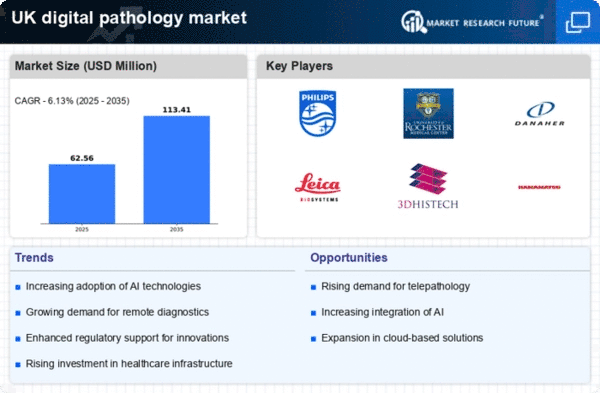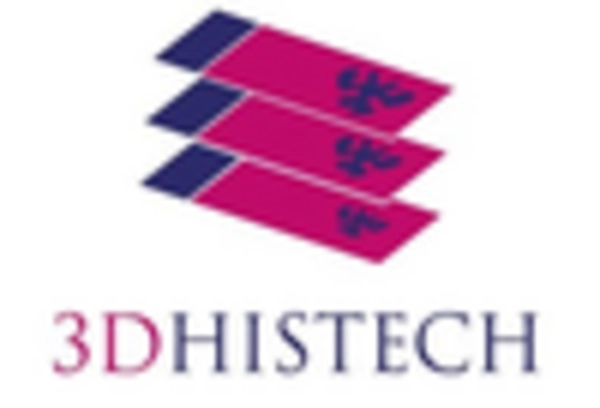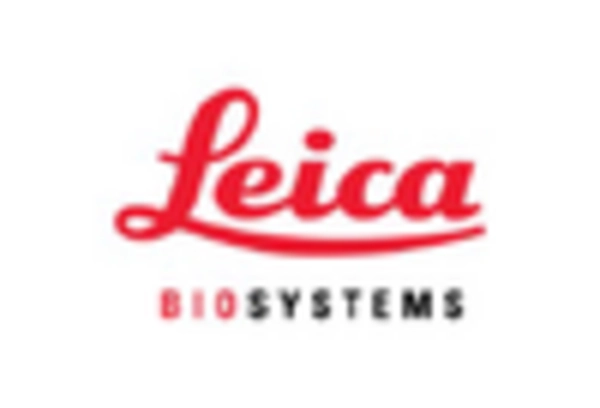Growing Focus on Personalized Medicine
The shift towards personalized medicine is significantly influencing the digital pathology market in the UK. As healthcare professionals strive to tailor treatments to individual patient needs, the demand for precise diagnostic tools becomes paramount. Digital pathology technologies facilitate the analysis of complex biological data, enabling clinicians to make informed decisions based on specific patient profiles. This trend aligns with the broader movement towards precision medicine, which is expected to account for a substantial share of the healthcare market. The digital pathology market is likely to see increased adoption as healthcare providers seek to enhance their capabilities in delivering personalized care. It is estimated that the market could witness a growth rate of around 10% annually, driven by the need for advanced diagnostic solutions that support personalized treatment plans.
Advancements in Artificial Intelligence
The integration of artificial intelligence (AI) into the digital pathology market is emerging as a transformative driver. AI technologies enhance image analysis, allowing for more accurate and efficient diagnostics. By automating routine tasks, AI can significantly reduce the workload of pathologists, enabling them to focus on complex cases. The potential for AI to improve diagnostic accuracy and speed is attracting considerable attention from healthcare providers in the UK. As AI continues to evolve, its applications in digital pathology are expected to expand, leading to increased adoption of these technologies. Current estimates suggest that the AI market in healthcare could reach £35 billion by 2027, with a substantial portion dedicated to digital pathology solutions. This trend indicates a promising future for the digital pathology market as AI becomes an integral component of diagnostic processes.
Rising Demand for Efficient Diagnostics
The digital pathology market in the UK is experiencing a notable increase in demand for efficient diagnostic solutions. This trend is driven by the need for faster and more accurate diagnoses, which are essential in improving patient outcomes. The integration of digital pathology systems allows for enhanced image analysis and data management, facilitating quicker decision-making processes. As healthcare providers seek to streamline operations, the adoption of digital pathology technologies is projected to grow significantly. Recent data indicates that the market could expand at a CAGR of approximately 12% over the next five years, reflecting the urgency for innovative diagnostic tools in the healthcare sector. This rising demand is likely to propel investments in digital pathology market technologies, further enhancing their capabilities and accessibility.
Increased Investment in Healthcare Infrastructure
Investment in healthcare infrastructure within the UK is a critical driver for the digital pathology market. The government and private sectors are allocating substantial funds to modernize healthcare facilities, which includes the integration of advanced diagnostic technologies. This investment is aimed at improving healthcare delivery and patient care, thereby fostering the adoption of digital pathology solutions. As hospitals and laboratories upgrade their systems, the digital pathology market is expected to benefit from enhanced funding and resources. Reports suggest that the UK healthcare expenditure is projected to reach £200 billion by 2026, with a significant portion directed towards technological advancements. This financial commitment indicates a robust growth trajectory for the digital pathology market, as healthcare providers increasingly recognize the value of digital solutions.
Enhanced Collaboration Among Healthcare Professionals
Collaboration among healthcare professionals is becoming increasingly vital in the digital pathology market. The ability to share and analyze pathology images and data across different platforms fosters a more integrated approach to patient care. Digital pathology solutions facilitate this collaboration by providing secure access to diagnostic information, enabling multidisciplinary teams to work together more effectively. This trend is particularly relevant in the context of complex cases that require input from various specialists. As healthcare systems in the UK continue to evolve, the emphasis on collaborative practices is likely to drive the adoption of digital pathology technologies. The market may see a growth rate of approximately 9% as healthcare providers recognize the benefits of enhanced teamwork and communication in improving patient outcomes.

















